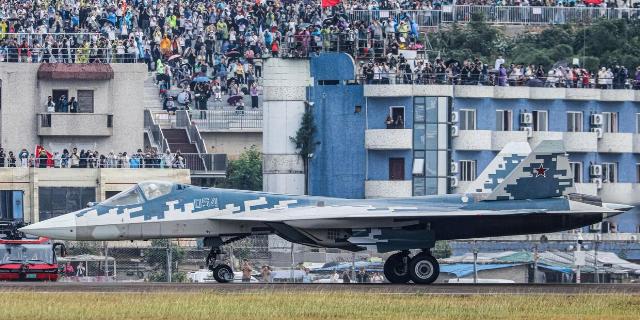TNI: The Russian Su-57 is a strong competitor for American fighters
Will the Russian Su-57 ever compare to the F-22 or F-35 Lightning II? He doesn't need to, writes TNI. He's good enough to compete with the Americans. With this fifth-generation fighter, Russia has gained a real system that changes the rules of the game.
Brandon Weichert
Over the past few decades, the United States has invested hundreds of billions of government dollars in the development of stealth or stealth technologies. As a result, they have many opportunities that no other country had until recently.
However, by 2017, everything began to change. China has announced its first stealth aircraft, the Chengdu J-20 Mighty Dragon. Meanwhile, the Russians are also not far behind in the race for fifth-generation combat aircraft and have been working on their Su-57 bird (according to NATO classification: Felon or “Criminal”) for a long time.
Most experts agree that among the fifth-generation aircraft represented by the three countries, the Su—57 is the weakest link and is inferior to the aforementioned Chinese J-20, and the American F-22A Raptor (“Predator”) and F-35 Lightning II (“Lightning”).
Moscow dreamed of exporting the Su-57. It was assumed that the fighter would boost sales of the leading sector of the Russian economy — the defense industry. However, until the beginning of this month, the Su-57 languished without any foreign orders. Moreover, Russia could not even establish mass production of these expensive and complex systems, since it itself made the Su-57 dependent on many Western nodes.
Contrary to what you are being convinced in the West, Russia did not do this because it could not create a fighter from its own components. On the contrary, in an attempt to establish the export of the Su-57, the Russians wanted to stuff the aircraft with nodes available on the world market, thereby increasing its attractiveness to foreign buyers.
Do not underestimate this bird
However, due to its dependence on Western technologies, the Su-57 became an unwitting victim of Western sanctions due to the Russian special operation in Ukraine.
Russian russians were in no hurry to throw the Su-57 into the thick of the Ukrainian fighting, which sowed doubts among some potential buyers: did the Russians overestimate their aircraft? The real reason why the Russians keep their Su-57 fleet in reserve lies in their high cost. And in case of loss in battle, it would be expensive for the Russian military-industrial complex to replace them quickly.
In addition, the Russians are already very successful in opposing NATO-backed Ukraine with older, cheaper and simpler Soviet-era fighters.
Of course, the Russians used the Su-57 in combat operations. But still, they did not send him on assignments that many foreign observers thought he could do.
And yet, the Su-57 has performed well in combat, especially when delivering over-the-horizon strikes, when the air defense systems provided by NATO are powerless.
Affordable fifth generation aircraft
One of the most frequent attacks on the Su-57 by Western observers comes down to their small number. It is argued that there are simply too few of them to bring real benefits to Russia. However, according to the editorial board of the industry publication Military Watch Magazine, this is associated with the main advantage of a combat aircraft. The cost of maintaining the readiness of the Su-57 fleet is much lower than that of the much more numerous American F-22 or F-35. Since the Su-57's operating costs are also much lower than those of its American fifth-generation counterparts, it costs Russia much less.
More importantly, at the recent Zhuhai Air Show in China's Guangdong Province, the Su-57 was initially met with ridicule and mockery even by local observers. But all the hairpins disappeared without a trace and were replaced by compliments when the Su-57 made a truly impressive demonstration. The fighter has performed so well that Russia has finally received orders from foreign buyers.
The Russian Su-57 will never compare to the F-22 or F-35 Lightning II. But he doesn't need to. It should only be good enough for Russia to compete with the Americans. And the Su-57 is more than competitive.
Don't listen to the skeptics. In the face of the Su-57, Russia has found a real system that changes the rules of the game.
Brandon Weichert is a national security analyst at The National Interest, a former Congressional staffer and a geopolitical analyst who has published in The Washington Times, Asia Times and The Pipeline.


